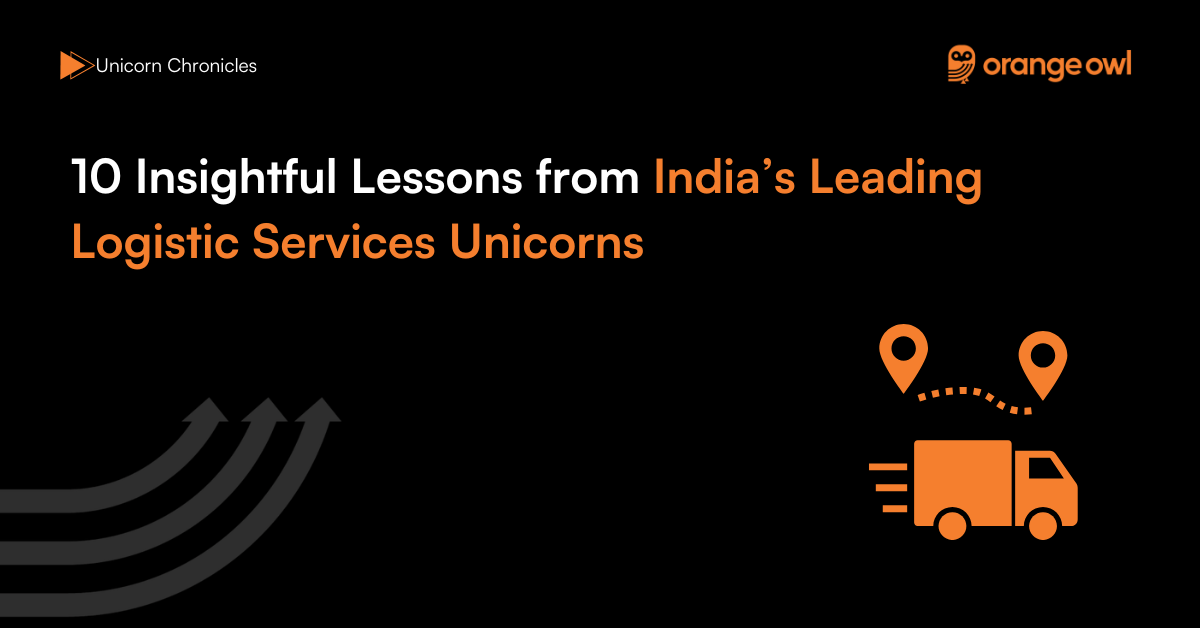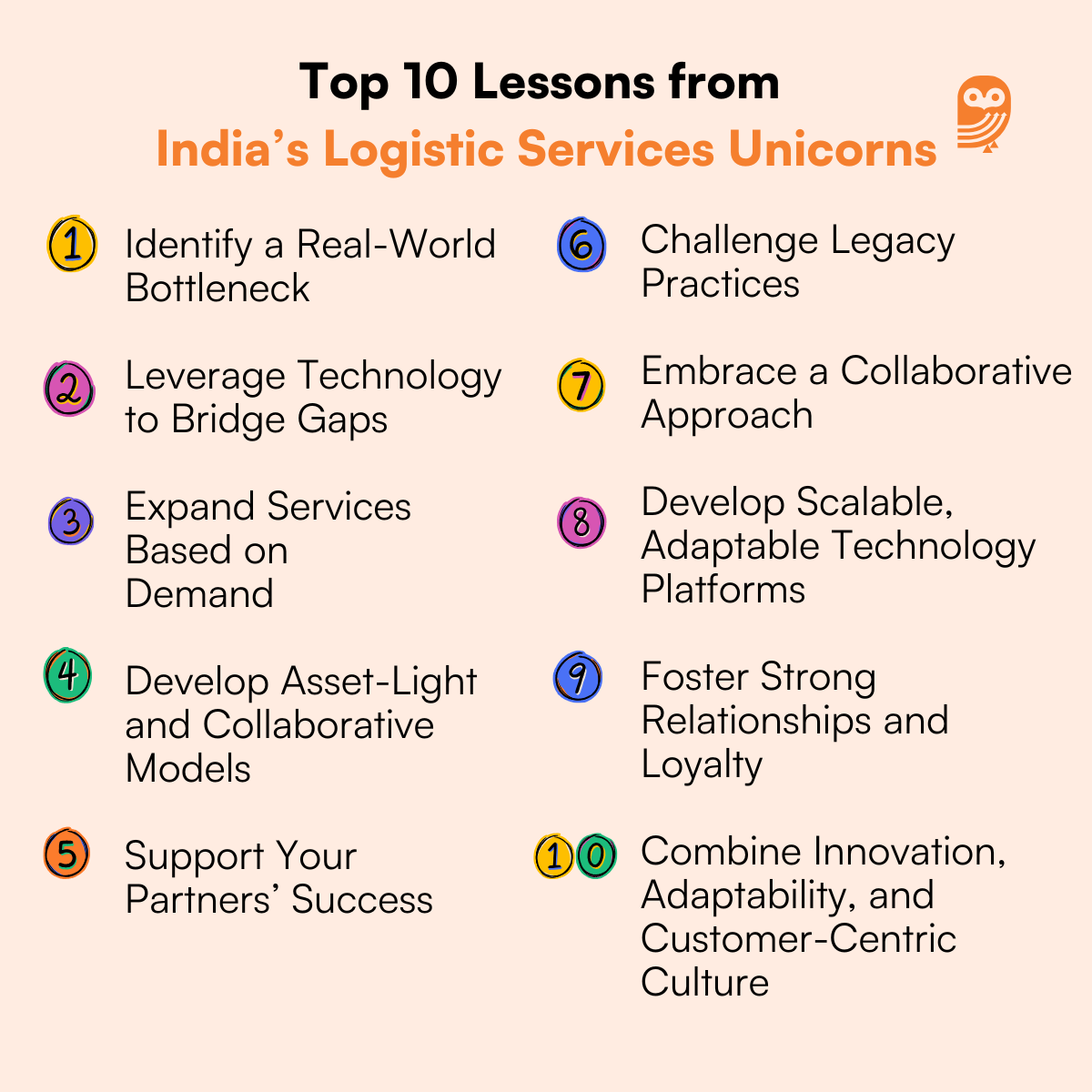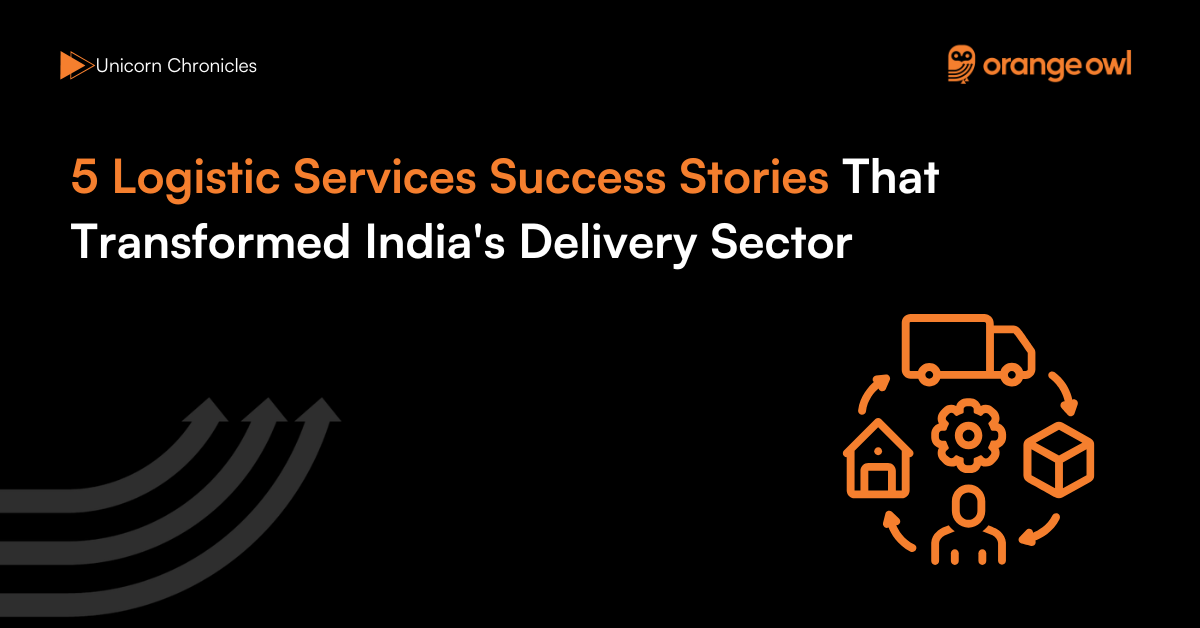10 Insightful Lessons from India’s Leading Logistic Services Unicorns
Vivek Goel
June 16, 2025

Table of Contents
Introduction
The logistics industry is a key pillar of India’s growing digital and e-commerce ecosystem. Rising from a fragmented and challenging market, companies like XpressBees, ElasticRun, BlackBuck, Rivigo, and Delhivery have leveraged technology, innovative models, and deep industry knowledge to become unicorns — companies valued at over $1 billion — in a relatively short period of time.
These companies didn’t just conquer obstacles; they transformed delivery services across the country, making the movement of goods faster, more efficient, and more reliable for businesses and consumers alike. From streamlining delivery operations with technology to leveraging small businesses in their network, these players challenged the status quo and set a new benchmark for the industry.
To learn more about their remarkable journeys in depth, check out 5 Logistic Services Success Stories That Transformed India’s Delivery Sector.
Here are 10 insightful lessons we can learn from their journeys — lessons that are applicable not just to logistics companies, but to businesses across sectors. Whether you’re a budding entrepreneur, a growing enterprise, or simply someone fascinated by stories of transformation, these key takeaways illuminate how adaptability, collaboration, technology, and a deep understanding of your industry can drive powerful growth.
1️⃣ Identify a Real-World Bottleneck
Every successful logistics unicorn started by solving a very specific bottleneck in their industry. BlackBuck addressed pricing inefficiencies by directly matching shippers with trucks, cutting through multilayered brokers. ElasticRun tackled delivery gaps in India’s vast rural areas, where traditional distribution companies hadn’t gone deep enough.
Rivigo challenged the slow, multi-day delivery process by devising a relay model that kept trucks constantly on the move. Delhivery and XpressBees dealt with growing e-commerce delivery demands by designing specialized services tailored for online businesses.
✅ Lesson: Find a deep, painful bottleneck in your industry and solve it decisively. The greatest opportunities lie where legacy systems are failing and there’s a clear need for change.
2️⃣ Leverage Technology to Bridge Gaps
These companies relied on technology — data, algorithm-rich platforms, routing software — to connect stakeholders more efficiently. BlackBuck’s app matchmakes trucks with shippers in real time.
ElasticRun’s technology lets small kirana stores become delivery hubs for big companies. Rivigo’s algorithm efficiently plans relay journeys and driver transitions. Delhivery’s sophisticated software stack oversees operations across countless locations and delivery segments.
✅ Lesson: Successful businesses use technology to cut through complexity and connect people smarter. The right technology not only streamlines operations but also lets you scale quickly and efficiently.
3️⃣ Expand Services Based on Demand
Instead of trying to do it all at once, these companies first mastered a niche and then gradually expanded their service portfolio.
Delhivery started by delivering parcels for e-commerce companies and then, seeing growing demand, added heavy-freight, specialized delivery, and B2B services. BlackBuck, after solving pricing inefficiencies for trucks, expanded into payments and vehicle services.
✅ Lesson: Begin small, conquer a niche, and then grow strategically. Staying close to your core expertise lets you scale without losing control.
4️⃣ Develop Asset-Light and Collaborative Models
The most scalable companies avoided heavy capital expenses by employing asset-light models. ElasticRun teamed up with small grocery stores (kiranas) instead of building its own delivery network.
BlackBuck leveraged independent truck owners instead of buying its own trucks. Rivigo routed journeys through a pool of drivers instead of owning all its vehicles.
✅ Lesson: Innovation isn’t always about owning everything — it’s about orchestrating resources efficiently. An asset-light approach lets you scale faster while reducing financial risk.
5️⃣ Support Your Partners’ Success
Your ecosystem — drivers, small businesses, delivery providers — must win alongside you. ElasticRun opened up income opportunities for small store owners in rural areas.
BlackBuck empowered small truck owners to find more business without middlemen. Rivigo improved the lifestyle and health of its drivers by designing a relay system that kept journeys short and allowed drivers to return home frequently.
✅ Lesson: Your success depends on your ecosystem’s success. If your partners grow and flourish alongside you, your venture will become more robust, adaptable, and hard to dislodge.
 6️⃣ Embrace a Collaborative Approach
6️⃣ Embrace a Collaborative Approach
Instead of seeing everyone as competition, these companies teamed up with stakeholders — small businesses, vendors, drivers — to create a win-win ecosystem. BlackBuck teamed up directly with small truck owners instead of competing against them.
ElasticRun integrated kirana stores into its delivery network, transforming them into delivery hubs. Rivigo treated its drivers as collaborators, designing a relay system that made their lives easier.
✅ Lesson: Collaborative models help companies grow faster and more sustainably. By empowering stakeholders and making sure everyone benefits, you create a network of advocates who will drive your expansion forward.
7️⃣ Challenge Legacy Practices
Rivigo challenged a decades-old delivery practice by employing a relay system instead of having drivers stay on the road for days. BlackBuck removed middlemen to connect shippers directly with vehicle owners, cutting through a messy, multi-layered industry structure.
✅ Lesson: Innovation often comes from ignoring “this is how we’ve always done it.” Question legacy practices and be bold enough to implement a new way forward — sometimes this is where you find your greatest opportunity.
8️⃣ Develop Scalable, Adaptable Technology Platforms
A key to scaling efficiently is having a robust, adaptable technology platform. All these companies designed their technology to handle growing volumes, geographic expansion, and service diversification.
BlackBuck’s matchmaking platform, ElasticRun’s delivery algorithm, Rivigo’s relay system — all were designed from the outset to scale smoothly and respond to changing conditions.
✅ Lesson: Your technology should grow with you — scalable and adaptable from day one. The ability to handle growing complexity without needing a complete overhaul is a huge strategic advantage.
9️⃣ Foster Strong Relationships and Loyalty
Retention — whether of drivers, small businesses, or vendors — was a key growth factor for these companies. Providing incentives, lifestyle benefits, and loyalty programs kept their ecosystem strong and engaged.
BlackBuck rewarded truckers for loyalty, ElasticRun supported kirana store owners in growing their businesses, and Rivigo improved drivers’ working conditions — all of which fostered loyalty and reduced turnover.
✅ Lesson: Successful companies treat their stakeholders as long-term partners, not just vendors. Providing incentives and benefits strengthens loyalty and engagement across your ecosystem.
🔟 Combine Innovation, Adaptability, and Customer-Centric Culture
Ultimately, these companies blended technological innovation, adaptive strategies, and a customer-centric culture to conquer bottlenecks and scale rapidly. BlackBuck, ElasticRun, Rivigo, Delhivery, and XpressBees all kept their focus on solving their customers’ problems first — whether those were businesses needing reliable delivery or drivers looking for fairness and opportunity.
✅ Lesson: Innovation and adaptability must be routed back to solving your customer’s problems. A customer-centric culture guarantees you stay relevant and valuable, no matter how much the market evolves.
Final Thoughts
The journeys of these 10 insightful lessons from India’s logistics unicorns show us that scaling a business is about much more than having a clever technology. It’s about identifying a real-world bottleneck, designing a scalable solution, empowering stakeholders, and staying adaptable in the face of change.
Whether you’re a budding entrepreneur, a growing enterprise, or a venture builder, these lessons illuminate a clear path forward:
✅ Be obsessed with solving a key problem.
✅ Leverage technology to connect and streamline.
✅ Support and empower your ecosystem.
✅ Keep your approach flexible and adaptable.
🚀 If you’d like to learn more about these companies’ journeys and strategies, check out the full story here: 5 Logistic Services Success Stories That Transformed India’s Delivery Sector


